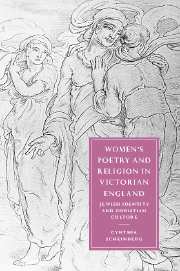Book contents
- Frontmatter
- Contents
- Acknowledgments
- 1 Introduction
- 2 “Sweet singers of Israel”: gendered and Jewish otherness in Victorian poetics
- 3 Elizabeth Barrett Browning and the “Hebraic monster”
- 4 Christina Rossetti and the Hebraic goblins of the Jewish Scriptures
- 5 “Judaism rightly reverenced”: Grace Aguilar's theological poetics
- 6 Amy Levy and the accents of minor(ity) poetry
- Notes
- Bibliography
- Index
- CAMBRIDGE STUDIES IN NINETEENTH-CENTURY LITERATURE AND CULTURE
2 - “Sweet singers of Israel”: gendered and Jewish otherness in Victorian poetics
Published online by Cambridge University Press: 22 September 2009
- Frontmatter
- Contents
- Acknowledgments
- 1 Introduction
- 2 “Sweet singers of Israel”: gendered and Jewish otherness in Victorian poetics
- 3 Elizabeth Barrett Browning and the “Hebraic monster”
- 4 Christina Rossetti and the Hebraic goblins of the Jewish Scriptures
- 5 “Judaism rightly reverenced”: Grace Aguilar's theological poetics
- 6 Amy Levy and the accents of minor(ity) poetry
- Notes
- Bibliography
- Index
- CAMBRIDGE STUDIES IN NINETEENTH-CENTURY LITERATURE AND CULTURE
Summary
“INSUFFICIENT AND PARTIAL”: JEWISH PROPHETS, WOMEN POETS, AND THE TYPOLOGICAL PARADIGM
Certainly any one would be surprised to find how large a part Poetry plays in the Holy Scriptures. For, if I am not mistaken, nearly half the sacred volume was written in metre … Hence it is sufficiently clear that a kind of relationship exists between those subjects which God has ordained to prepare the way for his Gospel and the dispositions and tone of mind of those whom we honour pre-eminently as poets or at least as disciples of the poets … Therefore I cannot help believing that it was in more than one way that the Hebrew seers and poets prepared their nation to receive the later revelation of Truth.
(John Keble, Lecture XL of Lectures on Poetry (Praelectiones Academicae) 474)Her various writings show that she has drunk true inspiration from the fountain to which she has so often resorted with the graceful vase of her natural genius. Miss Barrett is singularly bold and adventurous. Her wing carries her, without Miss Barrett is singularly bold and adventurous. Her wing carries her, without faltering at their obscurity, into the cloud and the mist, where not seldom do we fail to follow her, but are tempted, while we admire the honesty of her enthusiasm, to believe she utters what she herself has but dimly perceived.
(George Bethune, The British Female Poets, 452)- Type
- Chapter
- Information
- Women's Poetry and Religion in Victorian EnglandJewish Identity and Christian Culture, pp. 32 - 61Publisher: Cambridge University PressPrint publication year: 2002



